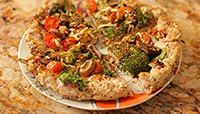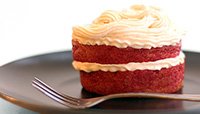Worried about Germs?
Maybe We Keep Things Too Clean
We've spent the better part of the past century sterilizing everything in sight, from milk to meat to produce, our hands, and anything else that might carry a germ or two.
You can call it "germophobia," and I confess I'm the biggest germophobe in sight. I wash my hands frequently, scrub raw produce clean and sometimes soak it in white vinegar or other natural microbe-killers, and keep an immaculate house (no outdoor shoes allowed). I handle chicken meat and eggs with extra caution, to avoid salmonella.
I go crazy with caution in public restrooms (my hand seldom touches anything in a public restroom except water and a paper towel).
Now it turns out all this caution may be a mistake. Read on for the latest...
Continued below...
Could Your Daily Diet Actually Cause Cancer?
It's an alarming and little known fact, that the foods you love to eat daily can actually jumpstart and accelerates the growth of cancer in your body.
Food is what really matters... and eating the wrong foods can create allergies and suppress your immune system. Your diet is key to giving you the maximum amount of energy and fuel needed to get through your hectic day.
By eating the wrong kinds of food you actually weaken your immune system and could spark a chain reaction that creates the perfect environment for cancer cells to attack and thrive.
But now, there's a revolutionary way to eat to eradicate your risk of cancer, heart disease and even Alzheimer's.
Keith Scott-Mumby MD, the world's " Number One Allergy Detective", introduces his amazing world-class food regime, that's been proven to be the best immunity and cancer fighting diet, for the last 32 years.
Click here to discover the optimal foods to boost and strengthen your immune system and design your own personal anti-cancer diet! |
Research is turning up plenty of evidence we may have shot ourselves in the foot with all this cleanliness. Germs can be good for you.
Scientists now know you're not alone in your body. You share it with about 100 trillion microbes. They're on the surface of your skin, on your tongue, and deep in the coils of your intestines. And you should be happy they're there.
The bugs outnumber you by ten to one
The hundreds of bacterial species that call you home completely outnumber your own cells. For every intrinsically human cell in your body (i.e., one with your DNA), you have 10 resident microbes. And very few of them cause a disease.
The quality of your health, as it turns out, is intimately linked to your microbial health. You probably know about "good" bacteria in your intestines. But that's old stuff. Other organisms play a much greater role in our health than mere digestion.
There's more to you than "you"
Your gut constitutes what's known as your "second genome". The first one is your own DNA, your 23 chromosomes present in every cell that you would normally think of as "yours."
But the second genome may exert a far greater influence on your health than the genes you inherited from your parents. An astounding 99 percent of your genetic expression ismicrobial. You're stuck with the genes you got from your parents, but you may be able to radically reshape your second genome.
And you should want to, because disorders in your gut can lead to a whole list of chronic diseases, infections, allergies, and obesity.
Scientists are just beginning to unfold this mystery
Despite new discoveries, many mysteries remain. For example:
- Obese mice transplanted with the intestinal microbes of lean mice lose weight, and vice versa. The reasons are still unknown.
- Gut bacteria of a lean donor were transferred to males with metabolic syndrome, resulting in marked improvements in insulin sensitivity.1
- Installing a healthy person's gut microbes into a sick person's gut has been effectively used to treat the antibiotic-resistant intestinal pathogen C. difficile, which kills 14,000 Americans annually.
- Nutritionists were at one time confounded about why a group of complex carbohydrates called oligosaccharides are found in breast milk, since babies lack the enzymes to digest them. Turns out they weren't there to nourish the baby, but a bacterium in the gut called Bifidobacterium infantis. This friendly bacterium helps break down the oligosaccharides in the milk.
Mother's milk isn't sterile… it provides both a "prebiotic" (a food for microbes) and a "probiotic" (actual beneficial microbes). When nature creates a food, it feeds both the person and the gut bugs. Try doing that with processed foods!
Our mad crusade to rid the world of germs
We don't have to worry much about infectious diseases like TB or typhus anymore. But people still living can remember when TB was the #1 cause of death.
My grandmother died of an infection acquired in giving birth to my mother — most likely because the doctor didn't wash his hands. And my grandmother's brother had died just a couple years before that from typhus, most likely acquired from fecal-contaminated drinking water. So my great-grandparents lost both of their children in their twenties, and my mother never knew her mother — all because people didn’t worry about germs.
I'm not nostalgic for the old days. Modern medicine's great claim to fame is the victory over these diseases and others caused by germs. But oddly enough, if you live past the age of 50 or so you're probably not as healthy as a person who lived to that age in 1900. Fewer people DID live that long, but those who did were remarkably hardy.
Is all the chronic disease surrounding us linked to unintended side effects of our war on pathogens (i.e. germs)?
For example, rural people from West Africa and the Amerindians in Venezuela not only have a larger selection of microbes than we have — they have different actual microbes than Americans and Europeans. They tend to live closer to the earth, in a dirtier environment, and eat more plant foods. And they have far less chronic disease.
Is our lower biodiversity in the West linked to our reckless abandon with antibiotics (in health care and in food), too much processed food (which has been stripped of all bacteria, both good and bad), environmental toxins, and generally less exposure to grass, dirt, sand, and plants?
Be a good host to your microbes,
And they'll treat you like gold…
So what services do these 100 trillion or so microbes do for you, provided you're a gracious host?
- "Invasion resistance". Good germs keep bad germs from gaining a foothold by occupying potential microbial openings — and making your internal environment inhospitable to invaders. This may be why some people fall victim to food poisoning, while others can merrily eat the same foods with no problems.
- Produce neurotransmitters, enzymes, vitamins, and signaling molecules.These include serotonin, with its benefits for mood, appetite, sleep, memory and learning, and social behavior... and amino acids, B vitamins and vitamin K.
Good microbes also help regulate stress and may impact temperament.
- Regulate the passage of food through their "kingdom". Good microbes produce and regulate signals that direct appetite, satiety, and digestion. "Satiety" is the feeling that you've had enough when you've eaten.
- Keep your immune system engaged. Scientists now know your immune system is far more complex than earlier believed.
Super-fast growth may keep you alive
One theory about why your microbes are so important is that they evolve incredibly fast. This means they can quickly respond to threats and changes in your environment in as little as 20 minutes.
They're exquisitely reactive and adaptive, and can trade genes and genetic information among themselves. This helps when you're exposed to a toxin or food needing a specific gene to fight it. Or eat it.
Your gut bacteria continually read your environment and respond on your behalf. They fight for you while you're busy living your life… if you encourage and nourish them.
Love 'em or lose 'em
If you don't love your gut bacteria, they can't help you. Yet you may damage them every day by these two mistakes…
- Antibiotics.
Farmers have performed a grandiose experiment for 60 years, giving sub-therapeutic antibiotics to animals for rapid weight gain. When you eat milk, meat, or cheese from conventionally-raised animals, you're getting a dose of antibiotics.
Of course, that's not all. American doctors hand out antibiotics like M&M candies. American children receive a staggering 10 to 20 courses of antibiotics by the time they turn 18, on average. Many adults take them as well. It's a scandal and a nightmare.
Strikingly, just one single course of antibiotics can cause your gut diversity to plummet… while causing an alarming rise of pathogens such as E. coli and salmonella.
After one course of antibiotics, your gut can bounce back to something near normal. But a recent study found that recovery after a second course was far less complete.
- Processed foods.
Americans eat mostly sterile foods (read: cooked, pasteurized, homogenized, canned or boxed…). It's impossible to get helpful bacteria from these processed foods. The damage is compounded by the fact that they're usually stripped of fiber, too.
Finally, scientists voice concerns about the additives in processed foods… few of which have ever been studied for their effects on health.
Emulsifiers like lecithin, Datem, CMC and polysorbate 80 can wreak havoc. These detergent-like compounds damage your mucosa — the protective lining of your gut wall — and can lead to leakage and inflammation.

Is this the hidden cause of inflammation?
Inflammation is linked to nearly every chronic disease. It's a common feature of metabolic syndrome, which predisposes people to cardiovascular disease, obesity, Type 2 diabetes, and even cancer.
But is inflammation a symptom of metabolic syndrome, or the cause of it?
The new theory is that it may actually begin with out-of-whack microbes in your gut.
An internal skin called your epithelium lines your digestive tract. It is literally large enough to cover a tennis court. More than 50 tons of food passes through it in the course of a lifetime.
Your beneficial bacteria play a crucial role in maintaining the epithelium's health. Your epithelium doesn't get its nourishment from your bloodstream as other tissues do. Instead, it's nourished through bacteria, especially bifidobacteria and Lactobacillus pantarum (common in fermented vegetables).
A malnourished epithelial barrier becomes permeable, allowing toxic byproducts of bacteria and proteins to leak into your bloodstream, initiating an immune system response.
Eventually, this low-grade internal inflammation leads to metabolic syndrome and the chronic diseases linked to it.
An experiment conducted in Brussels is telling… Mice fed a junk food diet also developed compromised gut barriers and endotoxin leakage, leading to metabolic syndrome.
The researchers concluded that, at least in mice, gut bacteria can INITIATE the inflammatory processes linked to obesity and insulin resistance by increasing gut permeability... suggesting that these ailments may begin with the gut, and how you care for it.
How to take good care of your microbes
Microbiologists studying the human gut are reluctant to make eating recommendations, citing the need for more study.
But when asked what measures they took to improve their own health based on what they'd learned, most admitted to these:
- They now avoid taking antibiotics whenever possible.
- Some spoke of relaxing the sanitary regime in their homes. And encouraged their children to play outside in the dirt and with animals.
- Many said they'd eliminated or cut back on processed foods, out of concern for additives, antibiotics, and lack of fiber.
- They chose foods likely to encourage the growth of good bacteria… like fermented foods.
- They ate a wider variety of raw plant foods, as different microbes enjoy chomping on different plant fibers. It's one of your best bets for increasing your microbial diversity.
So don't wait for "official" recommendations to improve your gut health. The components of a gut-friendly diet are already in your farmer's market and your grocer's produce and fermented foods aisles.
You depend on microbes for your life and health, so it's in your best interest to align yourself with their best interests by feeding them the things they like to eat.
And don't look for absolute control. It's likely we've gone too far in our zeal to kill absolutely all bacteria. It's probably impossible to have absolute control without collateral damage. Antibacterial soaps, for example, are overkill. Regular soaps are adequate.
Me? I don't view the new findings as a license to live dirty. Friendly germs and dangerous germs exist side by side and you can't be sure what kind are on the toilet you just sat on (or on the door handle of the restroom).
I'm a firm believer in a concept called "toxic load." Your immune system might be well able to fight off a million salmonella microbes, for example, but would be overwhelmed by a billion. This means you don't have to sterilize everything you touch as if you were going to perform surgery with it. Rather, you want to keep the exposure to microbes low and your immune system high. You want to keep the exposure manageable while maintaining a strong immune system that can handle the exposure you permit.
For example, E. coli, salmonella and most flu viruses only pose a danger to people with weak immune systems. As babies or elderly people tend to have weaker immune systems, they account for most of the fatalities you hear so much about. A person with a strong immune system may not get sick at all from a virus that can lay a weak person low or even kill him. Your emphasis should be on cultivating strong health that can handle life's normal challenges — NOT on killing every possible microbe.
I'm still going to avoid touching anything in public restrooms. I'll probably relax my caution about shaking hands, except during cold and flu season! I would still advise cleaning produce carefully. For one thing — plenty of microbes will survive even a thorough cleaning, so I'm confident I'll get my share of "good" bacteria by eating clean raw produce.
I already practice most of the cautions suggested in the list above. I haven't taken antibiotics in decades, I don't eat packaged and processed foods, and I eat plenty of raw and fermented foods.
There are many things our society should change (and probably won't). Pasteurization has been a disaster. Almost every drink of every kind in a supermarket has been pasteurized, meaning its nutritional value has been reduced (and sometimes wiped out altogether). Make your own juices from fresh produce.

|


















 Kim Peterson is a highly accomplished Natural Health and Wellness expert who has devoted 20 + years of her life to helping others with her extensive experience. Kim is best known for her popular website,
Kim Peterson is a highly accomplished Natural Health and Wellness expert who has devoted 20 + years of her life to helping others with her extensive experience. Kim is best known for her popular website,
